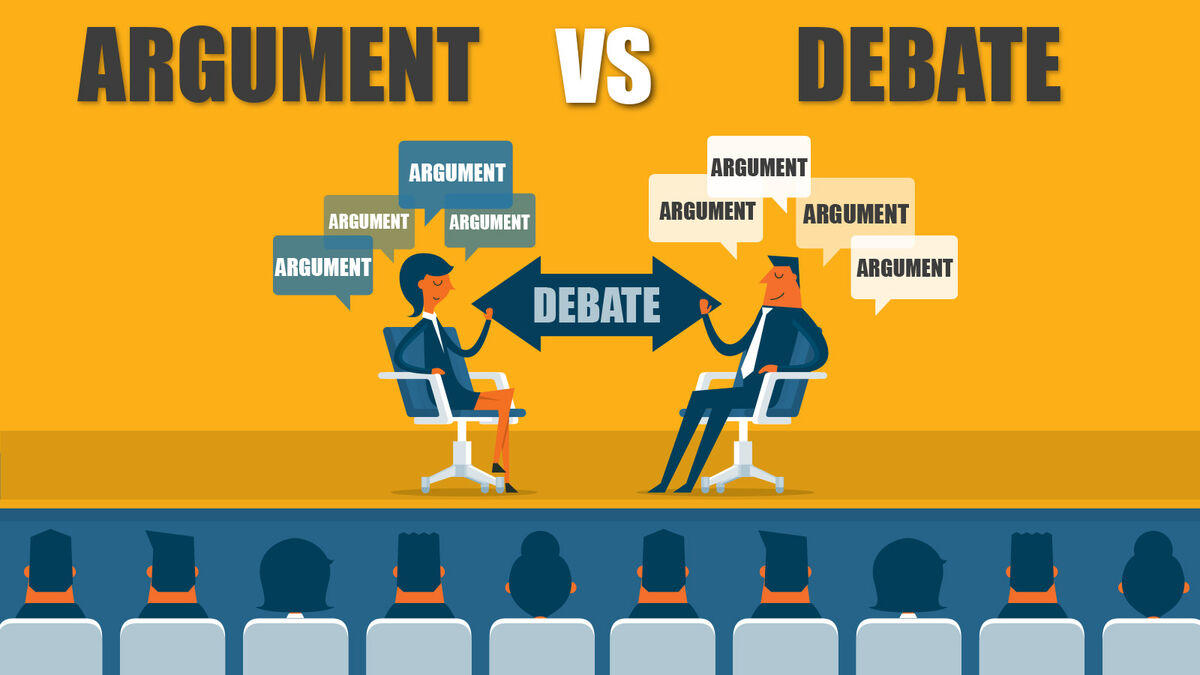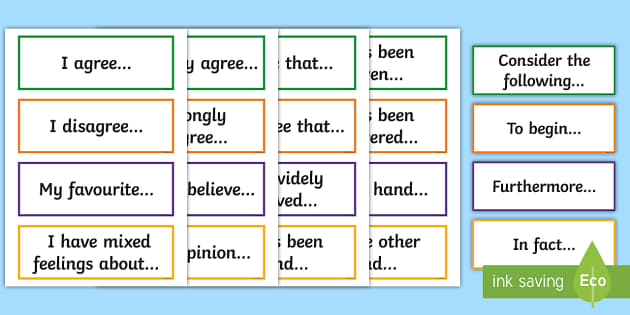Argument Vs Debate: What You Need To Know Before Buying?
Looking to understand the difference between an argument and a debate? You’re in the right place! Let’s dive into the fascinating world of verbal discussions, exploring how arguments and debates differ while discovering some tips to navigate them effectively.
Firstly, what exactly is an argument? Well, in everyday life, we often use the word “argument” to describe a disagreement or a heated exchange of opposing views. However, in a formal sense, an argument refers to presenting reasons or evidence to support a particular position or viewpoint.
On the other hand, a debate is a structured discussion where individuals or teams present arguments for or against a specific topic. It involves a more organized and civil exchange of ideas, usually guided by rules and time limits.
So, strap in and prepare for an enlightening journey as we unravel the intricacies of argument versus debate and discover the art of constructive communication!

Key Takeaways – Understanding the Difference Between Argument and Debate
- Arguments and debates are both ways people express their opinions.
- An argument is often emotional and focused on winning, while a debate is a respectful exchange of ideas.
- Arguments can lead to conflicts, while debates promote understanding and learning.
- In an argument, people often interrupt each other, but in a debate, everyone gets a chance to speak.
- In a debate, the goal is to persuade others through logic and evidence, while arguments rely more on personal beliefs.
Comparing Argument vs Debate
Arguing and debating are two common forms of communication that involve the exchange of ideas and opinions. While they may seem similar at first glance, there are significant differences between the two. In this article, we will explore the contrasting characteristics of argument and debate, examining their purposes, structures, and techniques. By understanding the distinctions between argument and debate, you can determine which approach is best suited for different contexts and goals.
Overview of Argument
Argument refers to the act of presenting a claim or viewpoint and supporting it with evidence and reasoning. In an argument, individuals aim to persuade others to accept their perspective. The primary goal is to convince the audience or the opponent of the validity of one’s position.
Argumentation involves constructing a logical and coherent line of reasoning, presenting evidence to support claims, and anticipating and responding to counterarguments. It requires critical thinking, clear communication, and the ability to analyze and evaluate information effectively.
Arguing can take place in various settings, such as informal discussions, academic debates, courtrooms, or political arenas. It is an essential skill in everyday life, as it allows individuals to express their beliefs and engage in intellectual discourse.
Overview of Debate
Debate, on the other hand, is a structured and formalized discussion between two or more individuals or teams. Unlike argument, the primary objective of a debate is not to persuade the opponent but to present conflicting viewpoints and examine their merits objectively.
In a debate, participants often take on assigned roles, such as the affirmative or negative side of a topic. They present their arguments, answer questions, and engage in rebuttals. The goal is to engage in a rigorous examination of ideas, challenge assumptions, and promote critical thinking.
Debating involves adherence to specific rules and procedures, including time limits, turn-taking, and following a structured format. It encourages participants to develop public speaking skills, logical reasoning, and the ability to articulate complex ideas in a concise manner.
Key Features Compared
When comparing argument and debate, several key features distinguish them from one another. Let’s explore these features in more detail:
Evidence and Reasoning
In an argument, individuals rely on evidence and reasoning to support their claims. They present facts, examples, and logical deductions to persuade others of their viewpoint. Emphasis is placed on the strength of the evidence and the logical coherence of the argument.
In a debate, evidence and reasoning are also crucial. However, the focus is not solely on persuading others but on presenting contrasting viewpoints and examining their validity. Debaters strive to provide convincing arguments while also objectively assessing the evidence and arguments presented by their opponents.
Structure and Format
Arguments can take various forms, from informal discussions to formal presentations. The structure and format of an argument may be less rigid and can adapt to the context and goals of the communication. The emphasis is on expressing and supporting one’s viewpoint effectively.
Debates, on the other hand, follow a more structured format. They typically involve specific rules, time limits, and alternating turns between participants. Debaters must adhere to these guidelines while presenting their arguments and engaging in rebuttals. The structured format allows for a more systematic and balanced examination of ideas.
Purpose and Goals
The purpose of an argument is often to persuade or convince others of the validity of one’s viewpoint. It aims to change minds, gain agreement, or influence decisions. Arguments may be more emotionally charged and focused on presenting a compelling case for a particular stance.
Debates, on the other hand, prioritize the examination of contrasting viewpoints and the pursuit of truth or understanding. The goal is not necessarily to change minds but to engage in a rigorous intellectual inquiry. Debaters strive to provide evidence, challenge assumptions, and critically evaluate ideas.
User Experience
The user experience of argument and debate can vary depending on the individual’s role and perspective. Both approaches have their own benefits and drawbacks.
When engaging in an argument, individuals have the opportunity to express their beliefs, engage in critical thinking, and present their case persuasively. Arguments can be intellectually stimulating and allow for the exploration of different perspectives. However, arguments can also become heated or emotionally charged, leading to potential conflicts or misunderstandings.
Participating in a debate offers individuals the chance to develop their reasoning, public speaking, and analytical skills. Debates promote critical thinking, articulate presentation, and the ability to listen and respond to opposing viewpoints. However, debates may feel more structured and formal, requiring adherence to specific rules and procedures.
Pros and Cons
Now, let’s dive into the pros and cons of argument and debate:
Argument:
Pros:
- Allows for the expression of personal beliefs and opinions.
- Encourages critical thinking and reflection.
- Offers the opportunity to persuade and influence others.
Cons:
- Can be emotionally charged and lead to conflicts.
- May prioritize persuasion over objective examination of ideas.
- Does not always encourage active listening and understanding of opposing views.
Debate:
Pros:
- Promotes critical thinking and analytical skills.
- Allows for the examination of contrasting viewpoints.
- Fosters the development of public speaking and presentation skills.
Cons:
- Can feel more formal and structured, potentially limiting creativity.
- Requires adherence to specific rules and procedures.
- May not prioritize individual expression and emotions.
Price Comparison
When it comes to the price comparison between argument and debate, it’s important to note that both approaches are essentially free. Engaging in argumentation or participating in debates doesn’t require any specific financial investment. Whether you choose to argue with friends, engage in academic debates, or join public speaking clubs, the cost is minimal or non-existent.
The true cost of argument and debate lies in the time and effort invested in developing the necessary skills and knowledge. While there may be costs associated with attending debate competitions or joining formal debate organizations, they are typically optional and depend on personal choices and circumstances.
Comparison Table
To summarize the key features and characteristics of argument and debate, let’s compare them side by side:
| Feature | Argument | Debate |
|---|---|---|
| Evidence and Reasoning | Relies on evidence and reasoning to support claims. | Presents contrasting viewpoints and evaluates their validity. |
| Structure and Format | Flexible format based on the context and goals. | Follows a structured format with specific rules and procedures. |
| Purpose and Goals | To persuade and convince others of a viewpoint. | To examine contrasting viewpoints and pursue understanding. |
Which is Better – Argument or Debate?
Deciding which is better, argument or debate, ultimately depends on the context, goals, and personal preferences. Both approaches have their own strengths and limitations.
Reason 1: Personal Expression vs. Intellectual Engagement
Arguments excel in allowing individuals to express their beliefs, engage in critical thinking, and persuade others. It is an effective approach in informal settings and when the primary goal is to influence others’ viewpoints. Arguments provide a platform for personal expression and emotional engagement.
On the other hand, debates prioritize intellectual engagement and the exploration of contrasting viewpoints. They foster critical thinking, analytical skills, and the ability to objectively examine ideas. Debates excel in formal settings and when the goal is to pursue truth, understanding, or balance.
Reason 2: Emotional Connection vs. Structured Examination
Arguments often involve emotional connections as individuals express deeply held beliefs and opinions. It allows for a more personal and subjective communication style, which can be powerful in certain contexts.
Debates, in contrast, offer a more structured and balanced examination of ideas. They focus on presenting contrasting viewpoints, which may reduce emotional bias and encourage objective analysis.
Reason 3: Context and Goals
The choice between argument and debate depends on the specific context and goals. Arguments are suitable for everyday discussions, informal settings, and persuasive situations. Debates are more appropriate in formal environments, academic settings, or when engaging in intellectual inquiry.
Ultimately, there is no definitive answer to which is better – argument or debate. Both approaches have unique benefits and can be effective depending on the situation. The key is to understand the distinctions between argument and debate and choose the approach that aligns with your objectives and context.
In conclusion, argument and debate are distinct forms of communication with their own characteristics, purposes, and techniques. While argument focuses on persuasion and personal expression, debate prioritizes intellectual engagement and the examination of contrasting viewpoints. Understanding the differences between argument and debate allows individuals to choose the most appropriate approach for different contexts and goals.
Frequently Asked Questions
Below are some commonly asked questions about the difference between arguments and debates.
1. What is the main difference between an argument and a debate?
An argument is a disagreement between two or more people, where they express different opinions or viewpoints. It often involves expressing emotions and can become heated. On the other hand, a debate is a structured discussion where two opposing sides present logical arguments and evidence to support their position. Debates are more formal and focus on presenting and refuting arguments using reason and evidence.
While arguments are more subjective and emotionally driven, debates prioritize reason and logical persuasion.
2. How do arguments and debates differ in their goals?
The goal of an argument is typically to convince the other person that your opinion or viewpoint is correct. People engage in arguments to express their emotions and defend their position. In contrast, the goal of a debate is to present a well-structured argument supported by evidence in order to persuade the audience. Debates aim to provide a balanced examination of competing viewpoints and help the audience make informed decisions.
Arguments are more focused on personal beliefs, while debates aim to explore various perspectives and facilitate critical thinking.
3. Are there any specific rules or guidelines for arguments and debates?
In an argument, there are no strict rules or guidelines. It often involves expressing strong emotions and can sometimes become disrespectful or aggressive. In a debate, however, there are generally agreed-upon rules that both sides adhere to. These rules include giving each side equal time to present their arguments, avoiding personal attacks, and using logical reasoning.
Debates have a structured format to ensure fairness and encourage a respectful exchange of ideas.
4. What skills are required for effective argumentation and debate?
Effective argumentation requires good communication skills, such as active listening, expressing thoughts clearly, and understanding the other person’s perspective. It also involves emotional intelligence to manage conflict and stay calm during disagreements. Debating skills, on the other hand, include researching and gathering evidence, constructing logical arguments, and presenting them persuasively.
Both argumentation and debate skills can be developed through practice and honed over time.
5. Which is more valuable, arguments or debates?
Both arguments and debates have their own value, depending on the context. Arguments can help individuals express their emotions and assert their viewpoints, fostering self-expression and providing a platform for negotiation. Debates, on the other hand, help develop critical thinking, enhance communication skills, and encourage logical reasoning.
While arguments can be useful for personal growth and resolving conflicts, debates have broader applications and contribute to a more informed society.

“An Argument at the Kids’ Table”: John Nichols on First GOP Debate Held Without Trump
Summary
This article compared arguments and debates to help you understand the differences between them. In an argument, people try to prove their point by using their emotions and opinions. But in a debate, they present logical reasons and evidence to support their views.
In an argument, people often get angry and focus on winning, which can lead to hurt feelings and broken relationships. On the other hand, debates are more respectful and focused on finding the truth or the best solution.
So, remember, when you have a disagreement, try to have a debate instead of an argument. Use facts and reasons to support your ideas and listen to the other person’s perspective. By doing this, you can have meaningful conversations and build stronger relationships.



